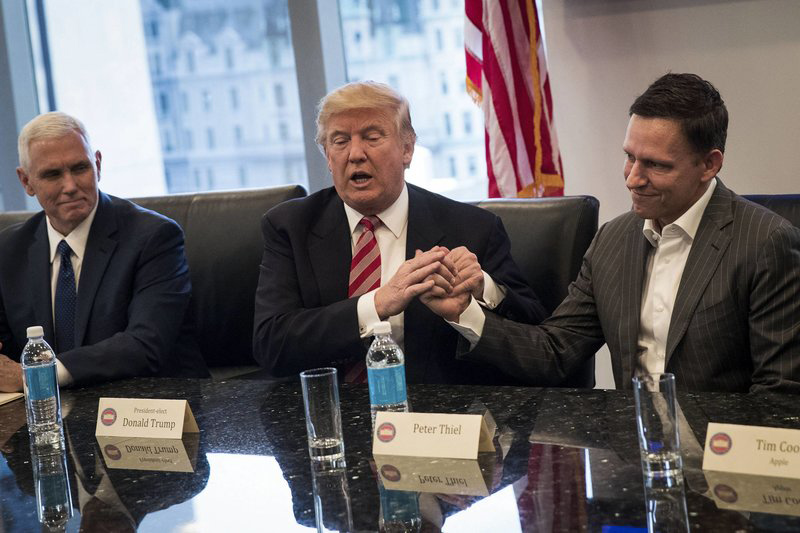特朗普提出5G计划,彼得·泰尔获益最大

|
美国的无线互联网接入的前景未明——不过局势很快就会尘埃落定。随着特朗普上个月在竞选连任活动上宣布了对于一家政府控制的5G网络公司的支持,争论变得更加激烈。 正如5G理念的推广者所样,开放、标准化的无线网络接入有许多优势。不过也存在一个大问题:该计划会给特朗普当局选择的公司带来巨额收入,原因可能出人意料——专利费。 特朗普在竞选中的提议本质上就是分配一段无线频谱,也就是手机和其他无线设备通信的无线电频率,供5G网络设备开放接入。这些设备需要遵循一系列决定何时通讯的协同规则,以免彼此干扰——就像人们在拥挤的晚宴上聊天一样。这种协同技术是Rivada Networks的业务核心。该公司由彼得·泰尔投资,是开放接入5G计划的公开支持者。 开放接入5G是否是个明智的构想,这点存在争议。的确,我的同事吉姆·贝克就撰文提出了一些关键的国家安全和实施问题。不过Rivada这样的公司不仅有构想,它们还有与之对应的专利。 Rivada在“动态频谱仲裁”(dynamic spectrum arbitrage)这项5G开放接入所需的协同技术上拥有至少40项全球专利。公司表示其“全面的”专利“全方位”涵盖了“动态无线网络共享”。这些专利让Rivada有了政府支持的独到优势,可以向任何使用公司开放接入技术的用户收费,或阻止他们使用,还可以起诉那些拒绝付费的用户。 一方面,Rivada持有的这类技术在市场上取得了成功,让公司通过竞争获取了专利回报。不过,通过游说特朗普当局将其作为国家标准,Rivada将会获益更多。每部手机、平板电脑或其他无线设备都会被要求按照规定遵守开放接入标准,也就是使用Rivada的专利。如此一来,这家公司就能从规模高达3.9万亿美元的移动技术和服务市场中获取几乎每一家公司的专利费用。更糟的是,它还能通过战略性的专利诉讼来选择市场竞争的胜者和败者。 一家扮演5G守门人角色的专利所有者无益于竞争市场或创新市场,尽管那些必须赞美守门人的公司之间存在着表面的竞争。联邦贸易委员会(Federal Trade Commission)对高通(Qualcomm)的诉讼和近来国际贸易委员会(International Trade Commission)发布的决定已经证明由垄断性专利许可方主导的技术市场既低效又错综复杂。而这些争端涉及的只是自行研制的私有标准。很容易想到,一项由联邦强制执行的标准会在经济上造成更加严重的影响。 我们几乎没有理由相信政府可以在强制推行全国统一的5G标准的同时避免陷入专利泥潭。特哈斯·纳雷查尼亚在2015年的一篇论文中详细阐述了政府在公共卫生或安全领域的目标与专利之间多次发生冲突的情况。专利胜出的次数远远多于政府。 Rivada这样的公司像专利的操偶师一般控制着5G标准,凸显了一个笼罩在美国经济之上的更大隐患。过去几十年里,专利所有者通过游说国会、法院、白宫,成功提高了专利的势力与强度。申请和使用专利变得更加简单,专利在诉讼中也更具价值。 对于在车库实验室中需要法律帮助的弱小创新者而言,强大的专利权可能很有诱惑力。但现在的创新已不复重前。如今,专利是与核心技术、广泛行业和政府规定交织在一起的复杂工具。在这样的新环境下,看似无伤大雅的政策理念,例如开放无线网络接入,可能会因为对反竞争专利的威胁而引发巨大影响。(财富中文网) 作者查尔斯·杜安是位于华盛顿特区的非营利、无党派智库R Street Institute的技术与创新政策主管。 译者:严匡正 |
The future of wireless Internet access in America is unclear—but it will be decided soon. The debate grew more serious last month, when the Trump re-election campaign announced its support for a government-controlled 5G network. There are many things to like about the idea of open, standardized access to the wireless airwaves, as promoters of the idea have argued. But there’s also a major problem: The plan would be a massive payout to a company hand-selected by the Trump administration, for a perhaps unexpected reason—patents. The Trump campaign proposal would essentially allocate a range of wireless spectrum, the radio frequencies by which mobile phones and all other wireless devices communicate, for open access to fifth-generation (5G) network devices. Those devices would need to follow a set of coordination rules for determining when to communicate, lest they end up interfering with each other—like people who talk over each other at a crowded dinner party. That coordination technology is at the heart of the business of Rivada Networks, the Peter Thiel-backed company that has been an outspoken supporter of the open-access 5G plan. There is debate over whether open-access 5G is a good idea; indeed, my colleague Jim Baker has written about some key national security and implementation issues. But companies like Rivada don’t just have ideas. They have patents on those ideas. Rivada has a sizable worldwide portfolio of at least 40 patents on “dynamic spectrum arbitrage,” the coordination technology needed for 5G open access. The company has described its patents as “sweeping” and covering the “full range” of “dynamic wireless network sharing.” Those patents give Rivada a government-backed privilege to demand payments from—or even stop—anyone using the company’s open-access technology, and to sue those who refuse. It would be one thing if technology like Rivada’s were successful in the market and the company reaped the rewards of its patents through competition. But by lobbying the Trump administration to adopt a national standard, Rivada stands to earn far more. Every phone, tablet, or other wireless device would be required by fiat to comply with open-access standards—and thus to use Rivada’s patents. That one company would be able to extract payments from potentially every player in the $3.9 trillion mobile technologies and services market. Even worse, it could choose winners and losers in that market through strategic patent litigation. A patent owner playing gatekeeper to 5G does not make for a competitive or innovative market, despite the superficial appearance of competition among those who must pay tribute to the gatekeeper. The Federal Trade Commission’s lawsuit against Qualcomm and recent decisions issued by the International Trade Commission attest to the inefficiencies and convolutions of technology markets dominated by monopolistic patent licensors. Those disputes involved voluntary, private standards; it is easy to imagine how a federally mandated standard could be far worse economically. There is little reason to believe that the government could sidestep a patent morass were it to impose a national 5G standard. A 2015 paper by Tejas Narechania details the many times that patents have come into conflict with government objectives like public health or safety. Far too often, the patents win. That a company like Rivada could play patent puppeteer over a national 5G standard illustrates a larger problem looming over the U.S. economy. Over the last few decades, patent owners have successfully lobbied Congress, the courts, and the White House to increase the power and strength of patents, making them easier to get, easier to use, and more valuable in lawsuits. For a small inventor in a garage lab who needs all the help the law can give, powerful patent rights can be attractive. But that is not innovation today. Now, patents are complex instruments intertwined with key technologies, ubiquitous industries, and government regulations. In this new environment, a seemingly innocuous policy idea, like open access to wireless networks, could have dramatic consequences because of the threat of an anticompetitive patent. Charles Duan is the director of technology and innovation policy at the R Street Institute, a nonprofit, nonpartisan think tank based in Washington, D.C. |













